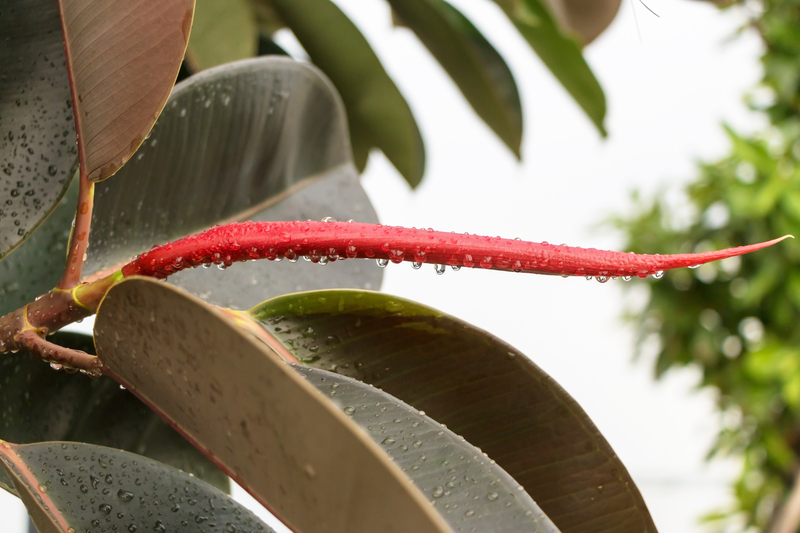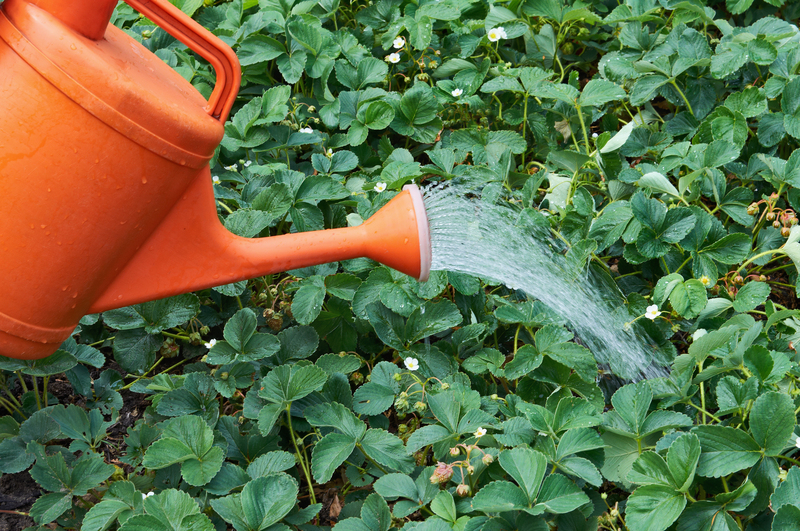Fundamental Tools for Every Garden Lover
Posted on 04/06/2025
Fundamental Tools for Every Garden Lover
If you are passionate about plants, flowers, and the meditative joy of outdoor work, assembling the right set of essential gardening tools is the key to success. Regardless of whether you tend a compact balcony garden or a sprawling vegetable plot, these must-have tools form the backbone of effective gardening. In this article, we'll explore the fundamental garden tools every enthusiast should own, their uses, plus tips to enhance your gardening experience.

Why the Right Tools Make a Difference in Gardening
Choosing and investing in quality gardening tools has a direct impact on your productivity, comfort, and results. The correct toolkit saves time and effort, ensures safety, and even prevents plant damage. In the long run, equipping yourself with the proper implements for every gardening task increases your enjoyment and success rate. Let's break down the basic garden tools every gardener should consider adding to their shed.
The Fundamental Garden Tools: An Overview
Here's a comprehensive list of the top garden tools that should be part of every garden lover's collection. These tools serve various functions, from soil preparation to pruning, and are integral to maintaining a beautiful, healthy garden.
- Hand Trowel
- Pruning Shears (Secateurs)
- Garden Fork
- Spade
- Hoe
- Watering Can or Hose
- Garden Gloves
- Wheelbarrow
- Garden Rake
- Garden Kneeler
- Weeder
- Loppers
Each of these essential gardening implements plays a unique role in different stages of the gardening process. Let's examine each tool, its uses, and tips for choosing the best version for your needs.
1. Hand Trowel: The Gardener's Best Friend
The hand trowel is an indispensable tool for all gardeners. Its small, scoop-shaped metal blade and ergonomic handle allow for easy digging, planting, and soil aeration.
- Use: Ideal for planting bulbs, herbs, transplanting seedlings, and digging small holes.
- Buying Tips: Look for a sturdy, rust-resistant metal blade and a comfortable, non-slip handle.
Invest in a high-quality hand trowel: it's a tool you'll reach for again and again.
Popular Variations
- Wide-blade trowels for transplanting.
- Narrow-blade trowels for precision tasks and rocky soil.
2. Pruning Shears (Secateurs): Precision for Every Plant
Good pruning shears are vital for keeping plants healthy and shaping them effectively. Proper pruning encourages new growth, removes dead or diseased wood, and maintains garden aesthetics.
- Use: Cutting stems, deadheading flowers, trimming small branches (typically up to 3/4 inch in diameter).
- Tips: Keep blades sharp and clean for precision cuts and to prevent spreading disease between plants.
Bypass vs. Anvil Shears: Bypass shears are best for live plants, while anvil shears work well for woody stems.
3. Garden Fork: For Soil Aeration and More
A garden fork (or digging fork) is perfect for breaking up compacted soil, spreading mulch, and mixing amendments deeply into garden beds.
- Use: Loosening, lifting, and turning soil, digging up potatoes and bulbs, compost turning.
- Choosing One: Opt for a fork with solid, forged tines for longevity and look for a comfortable, sturdy handle.
Regular soil aeration with a garden fork improves root penetration and drainage, fostering vigorous plant growth.
4. Spade: The Versatile Workhorse
Spades are fundamental in every gardener's arsenal. Their flat, rectangular blades are ideal for digging, edging beds, setting stones, and moving soil or compost.
- Use: Digging holes, edging borders, transplanting shrubs and trees.
- Choosing One: Weight and balance are key--select a size that's comfortable for your build and strength.
Care Tips for Spades:
- Wipe clean after use to avoid rust.
- Store in a dry place and occasionally oil wooden handles.
5. Hoe: For Weeding and Cultivating
There are many types of hoes--draw hoes, Dutch hoes, stirrup hoes, and more. Their common purpose is to help with removing weeds and cultivating soil.
- Use: Loosening the top layer of soil, chopping out weeds at the roots, creating furrows for seeds.
- Types: Stirrup hoes excel at cutting weeds just below the surface, while draw hoes are better for tougher, more compacted soil.
Regular hoeing prevents weeds from establishing deep roots, keeping your beds neat and healthy.
6. Watering Can or Hose: Hydration Made Easy
Plants need consistent water for optimal growth. Depending on your garden's size, a watering can or a garden hose will be part of your daily toolkit.
- Use: Delivering water to plants, especially seedlings and container gardens that require precise or gentle watering.
- Choosing One: A can with a detachable rose head allows for both gentle watering and direct streams. For hoses, look for kink-resistant, UV-stabilized options with adjustable nozzles.
Eco Tips:
- Water early in the morning or late in the day to reduce evaporation.
- Collect rainwater in barrels for an eco-friendly supply.
7. Garden Gloves: Protect Your Hands
Gloves are more than just a comfort accessory--they shield your hands from thorns, blisters, cuts and exposure to chemicals or soil pathogens.
- Use: All gardening tasks, especially those involving roses, pruning, or working in rocky soil.
- Choosing Gloves: Thick, puncture-resistant gloves are great for tough jobs; lighter, breathable gloves work well for general tasks.
Good gloves increase your confidence--and your comfort--when tackling any gardening project.
8. Wheelbarrow: Move with Ease
Whether you're hauling soil, mulch, plants, or garden waste, a wheelbarrow or garden cart dramatically reduces physical strain.
- Use: Transporting heavy or bulky materials easily around your garden.
- Choosing One: Look for lightweight yet sturdy models with pneumatic tires for rough terrain and a comfortable handle height.
9. Garden Rake: Gather and Level
A garden rake is essential for clearing leaves, spreading mulch, and creating a smooth seedbed.
- Use: Gathering debris, breaking up clumps of soil, leveling out beds.
- Variations: Leaf rakes (fan-shaped, flexible tines) for leaves; bow rakes (flat, rigid tines) for soil.
Keep a rake handy for a neat, picture-perfect garden all year round.
10. Garden Kneeler: Comfort Meets Functionality
Kneeling for extended periods can strain your knees and back. A garden kneeler or kneeling pad provides essential comfort and helps maintain a healthy posture during prolonged gardening sessions.
- Use: Planting, weeding, and close-up care for low-lying plants.
- Features: Some kneelers double as low seats for flexibility.
11. Weeder: Targeted Weed Removal
Manual weeders are specialized hand tools designed to extract weeds--roots and all--without disturbing surrounding plants.
- Use: Removing deep-rooted weeds like dandelions with minimal soil disruption.
- Choosing One: Look for long, slim designs for tough, deep weeds and comfortable grips to avoid fatigue.
Regular weeding keeps your garden productive and attractive.
12. Loppers: For Large Branches
Loppers are long-handled pruning tools ideal for cutting thicker branches and managing small trees or shrubs.
- Use: Cutting branches up to 2 inches in diameter, shaping shrubs, and removing dead wood.
- Tips: Choose loppers with extendable handles for extra reach and bypass blades for cleaner cuts.
Caring for Your Fundamental Garden Tools
Proper maintenance of your gardening tools extends their life and performance.
- Clean tools after each use to prevent rust and soil transfer.
- Dry thoroughly before storing.
- Sharpen blades regularly for precision and safety.
- Oil wooden handles to prevent drying and cracking.
- Store tools in a dry, protected area--preferably hanging on a wall or in a tool rack.
Top Tips for Choosing and Using Essential Gardening Tools
- Quality over Quantity: Invest in fewer, high-quality tools that last longer and work better.
- Comfort Matters: Try tools in person for grip and weight--ergonomics are crucial for extended gardening sessions.
- Keep your tools organized and accessible for efficient gardening on busy days.
- Upgrade slowly as your garden grows and your needs evolve.
Optional but Useful Garden Tools
Once you've mastered the basics, consider adding these handy gardening gadgets to your collection:
- Soil testing kits for checking pH and fertility.
- Garden scissors or snips for detailed trimming.
- Plant labels to keep track of varieties.
- Tool sharpeners to maintain blade edges.
- Garden aprons or tool belts for convenience.

FAQs About Fundamental Tools for Every Garden Lover
What are the most important garden tools for beginners?
Start with a hand trowel, pruning shears, garden fork, spade, watering can, and garden gloves. These basic gardening tools allow you to perform most essential gardening tasks easily and effectively.
How often should I replace my gardening tools?
With regular maintenance, high-quality gardening implements can last for many years. Replace tools if they become irreparably damaged, unsafe, or uncomfortable to use.
What's the best way to store garden tools for longevity?
Clean and dry your essential gardening tools after each use. Store them in a dry, well-ventilated spot--preferably indoors and hung up to avoid blade dullness and rust.
How can I make gardening less physically demanding?
Invest in ergonomically designed tools, use a wheelbarrow for heavy loads, a garden kneeler for low tasks, and always use garden gloves for protection.
Conclusion: Assembling Your Toolkit for Success
Equipping yourself with the fundamental tools for every garden lover is the first step toward a thriving, enjoyable gardening journey. These essential gardening implements not only save you time and effort but also keep your plants healthy and beautiful. Invest in quality, keep your tools in top condition, and enjoy many rewarding hours nurturing your garden oasis!
Whether you're a seasoned horticulturist or a home gardening beginner, the right set of basic garden tools can make all the difference--so happy gardening!
Latest Posts
The ultimate guide to growing an abundant and aromatic herb garden
Small Gardens, Big Impact: Fighting Climate Change Together
Unveiling the Art of Perfect Garden Seating Arrangements

